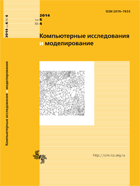Все выпуски
- 2024 Том 16
- 2023 Том 15
- 2022 Том 14
- 2021 Том 13
- 2020 Том 12
- 2019 Том 11
- 2018 Том 10
- 2017 Том 9
- 2016 Том 8
- 2015 Том 7
- 2014 Том 6
- 2013 Том 5
- 2012 Том 4
- 2011 Том 3
- 2010 Том 2
- 2009 Том 1
Укрупненная модель эколого-экономической системы на примере Республики Армения
Список литературы:
- , , , , , . Global emission reductions through a sectoral intensity target scheme // Climate Policy. — 2008. — V. 8, no. 1. — P. 46–59.
- , . A Multi-agent genetic algorithm for multi-objective optimization / Proceedings of IEEE International Conference on Systems, Man and Cybernetics. — Manchester, 2013. — P. 1391–1395. — MathSciNet: MR2979113.
- , , . Dynamics of the UK natural gas industry: system dynamics modelling and long-term energy policy analysis // Technological Forecasting & Social Change. — Elsevier, 2009. — V. 76, no. 3. — P. 339–357. — DOI: 10.1016/j.techfore.2008.06.002.
- , , . System dynamics modeling for urban energy consumption and CO2 emissions: A case study of Beijing, China // Ecological Modelling. — 2003. — V. 252. — P. 44–52. — DOI: 10.1016/j.ecolmodel.2012.09.008.
- . Investigating Causal Relations by Econometric Models and Cross-spectral Methods // Econometrica. — 1969. — V. 37, no. 3. — P. 424–438. — DOI: 10.2307/1912791.
- , , . The Limits to Growth: The 30-Year Update. — Chelsea Green Publishing, 2004. — 342 p.
- , , , . The Limits to Growth. — N.-Y: Universe Books, 1972. — 205 p.
- , . Multiobjective evolutionary algorithms: a comparative case study and the strength Pareto approach // IEEE Transactions on Evolutionary Computation. — 1999. — V. 3, no. 4. — P. 257–271. — DOI: 10.1109/4235.797969.
Журнал индексируется в Scopus
Полнотекстовая версия журнала доступна также на сайте научной электронной библиотеки eLIBRARY.RU
Журнал входит в систему Российского индекса научного цитирования.
Журнал включен в базу данных Russian Science Citation Index (RSCI) на платформе Web of Science
Международная Междисциплинарная Конференция "Математика. Компьютер. Образование"
Copyright © 2009–2024 Институт компьютерных исследований







